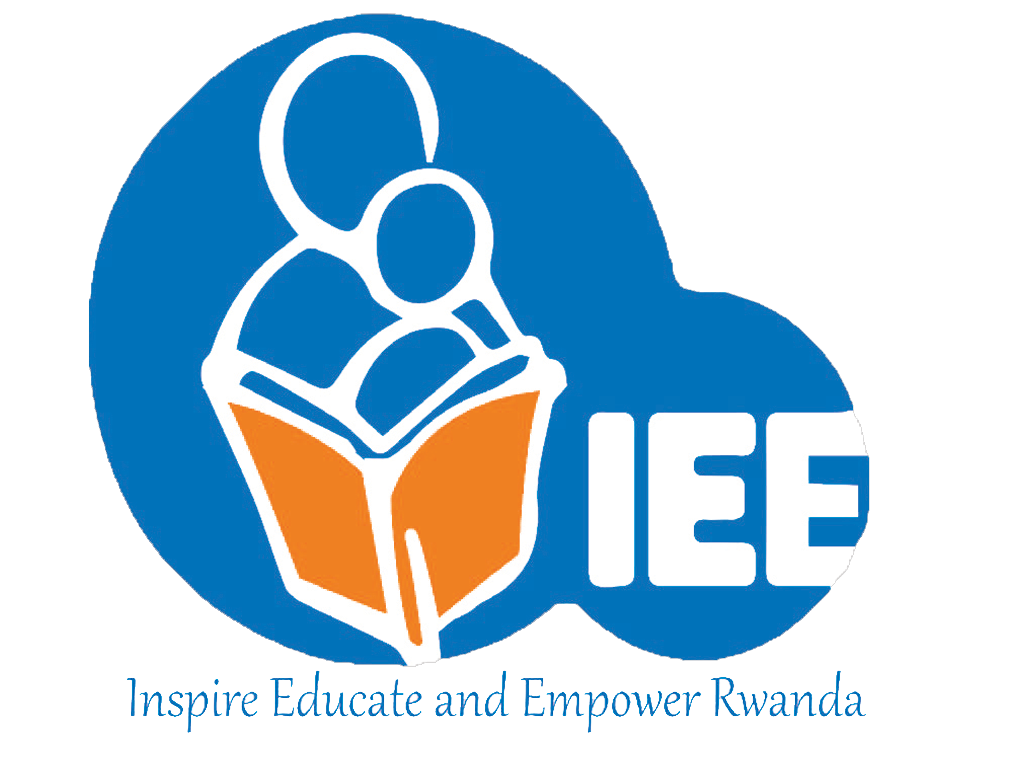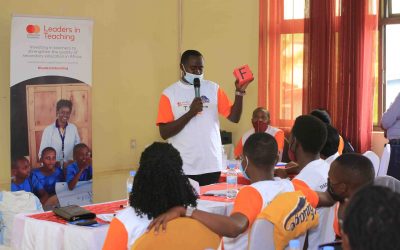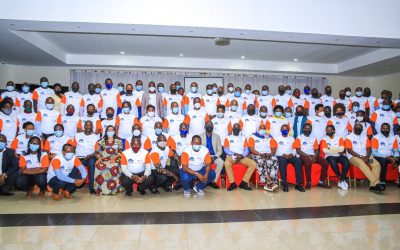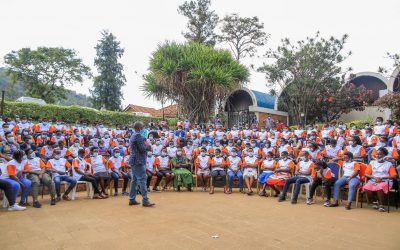Teaching Assistantships Project Phase II
PROJECT TIMELINE
July 2021 – June 2026
PROJECT DESCRIPTION
Having funded the pilot phase of the Teaching Assistantships Project during 2019, Mastercard Foundation is funding the second and rollout phase during July 2021-June 2026.
The Teaching Assistantships Project is broadly contextualized within Mastercard Foundation’s commitment to supporting livelihoods and opportunities for young people in Africa, particularly women, to secure dignified and fulfilling work by 2030. Specifically, in the context of the Leaders in Teaching (LIT) initiative in Rwanda, under its Recruit pillar, Mastercard Foundation has partnered with Inspire, Educate and Empower Rwanda (IEE) and Rwanda Basic Education Board to inspire school leavers in their transitional year to tertiary education, to take up teaching assistantships for 9 months whereby they support teaching and learning for primary and secondary students in science and humanities subjects in public and Government supported schools, while being interested to take up careers in education or support education.
Teaching Assistantships Project Phase II is informed by the Mastercard Foundation Impact Strategy whereby approach to impact is building on evidence from the pilot phase. Teaching Assistantships Project Phase II is focused on engaging young women and men as Teaching Assistants, in career interest and determination, biasing them towards taking up careers in education, having gained skills, values and attitudes necessary for a young generation of teachers and leaders contributing to quality teaching and learning, and social and economic transformation in Rwanda. It is intended that this leads to institutionalization of teaching assistantships, hence being country and community-owned, as the ultimate transformational systems change.
Mastercard Foundation’s Young Africa Works strategy has improvement of the quality of teaching and learning in secondary schools so young people have the skills and competencies they need to succeed in work and in life, as one of its major goals. In the context of the LIT initiative, under the Recruit pillar, IEE will support Teaching Assistants to support teaching and learning at schools of intervention, while also supporting them to gain skills, values and attitudes to become passionate, skilled teachers and preparing them to deliver high-quality secondary education so that in turn, young people have the skills and competencies they need to succeed in work and in life, in contribution to quality learning, for social and economic transformation in Rwanda.
Teaching Assistantships Project Phase II is utilizing the favorable policy environment in Rwanda and alignment of Young Africa Works strategy with the Education Sector Strategic Plan (2018/19 – 2024/25), to operationalize involvement of 3,000 high school leavers: 2,100 females (of whom 1,470 will support STEM subjects while 630 will support humanities) and 900 males (of whom 630 will support STEM subjects while 270 will support humanities). In implementation of the project, IEE is working within the national framework for teacher development.
Logistically, to support their day-to-day engagements in project activities, the 3,000 Teaching Assistants will each receive monthly transport allowances to enable them commute to schools of deployment and engage in project activities. At the end of their teaching assistantships, each of the Teaching Assistants will receive a wrap-up/start-up cash package to support with settling into tertiary education, having also received a laptop computer onto which will be loaded learning manuals, Government policies, particularly those that relate to Education and pedagogical support documents including curriculum documents, textbooks, learning guides, teacher guides, syllabi, and sample competence-based lesson plans.
To support their skill development, the 3,000 Teaching Assistants will each receive a package of modules to support their day-to-day work during teaching assistantships, as well serve as life skills reference manuals at tertiary level beyond. The manuals are English language for teaching, planning for teaching and teaching methodology, study strategies and personal development, gender awareness and gender responsive pedagogy, inclusive education, motivation and leadership skills and support for remedial education. Throughout their teaching assistantships, Teaching Assistants will be trained using activity-based strategies to prepare them for teaching during their deployments, and to equip them with a range of 21st Century skills to function as teachers and as advocates for education in future.
It is intended that Teaching Assistants have skills, values and attitudes requisite of a new generation of teachers, and active leaders participating in advancing their communities; join the teaching profession because of involvement in teaching assistantships; and Ministry of Education integrates teaching assistantships as part of national civic education programmes, as Key Performance Indicators. Consequently, this should lead to increase in the number of young people trained and educated with appropriate skills; increase in the number of young people engaged in skill-building opportunities provided by teaching assistantships; increase in the percentage of young people who completed skill-building opportunities provided by teaching assistantships and number of schools supported to enhance skills and knowledge of youth.
For sustainability of teaching assistantships, IEE will set up a Teaching Assistant alumni community, which will serve to connect graduated Teaching Assistants with new ones and which in schools, will serve to mobilize students to aspire to be Teaching Assistants guaranteeing project continuity. The alumni community will serve as a coordination platform, and as space for fraternity for young people to engage in supporting Education, with the solidarity which all project activities have been designed to build. This will consolidate skills gained from the project and create a ripple effect for the project, enabling generations of young women and men to engage in teaching assistantship activities beyond the scope of the project as teaching assistantships will be managed by schools, sectors, districts under overall guidance by the Rwanda Basic Education Board and Ministry of Education.
PARTNERS
- Ministry of Education
- Rwanda Basic Education Board
- Mastercard Foundation
- District Education Officers
- Directors of Education
- Sector Education Officials
- Schools
- African Institute for Mathematical Sciences
- Laterite Rwanda
- VVOB
- Forum for African Women Educationists (FAWE)
PROJECT TARGET IN FIVE YEARS
DISTRICTS
SCHOOLS
TEACHING ASSISTANTSHIP MENTORS
TEACHING ASSISTANTS
CURRENT PROJECT IMPACT
2022/23
DISTRICTS
SCHOOLS
TEACHING ASSISTANTSHIP MENTORS
TEACHING ASSISTANTS
PROJECT STORIES
IEE engages teachers to support teaching assistantships
The Teaching Assistantships Project is aimed at supporting opportunities for young people in the teaching profession, nurturing them to have interest in education particularly in Science, Technology Engineering and Maths (STEM). Mastercard Foundation partners with...
Head Teachers & Directors of Studies called to support implementation of the Teaching Assistantships Project
Head Teachers and Directors of Studies from the 116 selected 9-year Basic Education host schools, for the Teaching Assistantships Project (TAP II) were convened in two workshops respectively, organized by Inspire, Educate and Empower Rwanda (IEE) on November 27th and...
310 Teaching Assistants to be deployed in 116 schools
Teaching Assistants from all the 30 districts of Rwanda, concluded a four-day pre-deployment training, conducted by Inspire, Educate and Empower Rwanda (IEE), at the Rwanda Institute of Cooperatives, Entrepreneurship, and Microfinance (RICEM) in Kigali. The 310...
Teaching Assistantship Mentors trained to make young people passionate professional teachers, for quality teaching and improved student learning
A five-day orientation workshop for 30 Teaching Assistantship Mentors (TAMs), organized by Inspire, Educate and Empower Rwanda (IEE), was concluded on November 1st, 2021 at Olympic Hotel, Kimironko. The TAMs are being prepared to be deployed in the 30...




